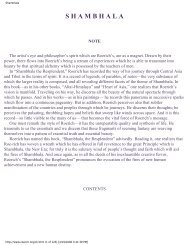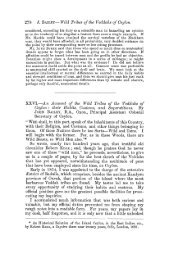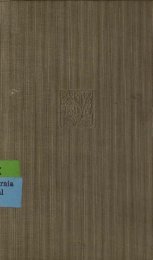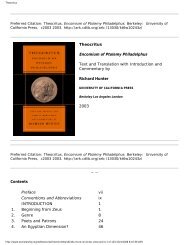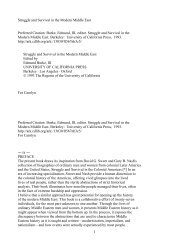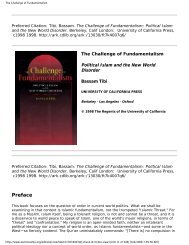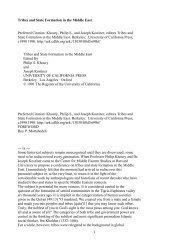Between Two Worlds Kafadar.pdf
Between Two Worlds Kafadar.pdf
Between Two Worlds Kafadar.pdf
Create successful ePaper yourself
Turn your PDF publications into a flip-book with our unique Google optimized e-Paper software.
elated to assumptions about a far-reaching, often underground, network of<br />
various "heterodox" associations in the medieval Middle East: guilds, futuwwa,<br />
batini * esotericists. The most elaborate depiction of that alleged network and<br />
tight organization can be found in the works of Louis Massignon, and it is dear<br />
in his case that the historian's imagination was partly shaped by the reality<br />
and phobia of international communism. See, for instance, his "La futuwwa ou la<br />
pacte d'honneur artisanale chez les travailleurs musulmanes," La Nouvelle Clio,<br />
1952. The works of Taeschner, whose identification of futuwwa as "Islamisches<br />
Ordensrittertum" was highly influential on Wittek and many others; see C. Cahen,<br />
"Futuwwa," EI , new ed., s.v.<br />
93. See, for instance, the documents published by A. Refik [Altinay], "Osmanli<br />
Devrinde Rafizîlik ve Bektasilik * ," Darülfünun Edebiyat Fakültesi Mecmuasi<br />
8/2(April 1932):21-59. Further relevant literature is cited in A. Y. Ocak,<br />
Osmanli Imparatorlugunda * Marjinal Sûfîlik: Kalenderîler (XIV-XVII. ¡ üzyillar)<br />
(Ankara, 1992), 189-92; also see S. Faroqhi, "Seyyid Gazi Revisited: The<br />
Foundation as Seen through the Sixteenth-and Seventeenth-Century Documents;<br />
Turcica 13(1981):90-122.<br />
94. "Al yesil * giyinmis * gercek * gazili / Ali nesli güzel imam geliyor."<br />
(Accompanied by the real gazis dressed in red and green / the beautiful imam<br />
from the line of `Ali * is coming). C. Öztelli, ed., Bektasi * Gülleri<br />
(Istanbul, 1985), 202. This and various other poems in this collection (and in<br />
others) that sing the praises of gazis like Seyyid Battal * > Gazi (p. 263) or<br />
of `Ali's * "gaza" should also remind us that gaza is not a specifically Ottoman<br />
or a necessarily Sunni ideology. The Safavids, too, fought as gazis, especially<br />
in the earlier stages of their enterprise. The poems of Shah Isma`il * (alias<br />
Hata'i * ) frequently invoke the three social forces that also appear in the<br />
sources of late-Seljuk and post-Seljuk Anatolia: the ahi * , the abdal * , the<br />
gazi. See Il Canzoniere di Sah * Isma`il * Hata'i * , ed. Tourkhan Gandjei<br />
(Naples, 1959), passim. In the case of Anatolia, Apz added a fourth and even<br />
more enigmatic category: the bacis (sisters).<br />
95. Ein Mesnevi Gülschehris auf Achi Evran, ed. F. Taeschner (Hamburg, 1930).<br />
The 1360 recasting of the Danismendname * by `Arif * `Ali * must also be<br />
mentioned here as a fourteenth-century frontier narrative, even though it deals<br />
with a relatively remote period. As for the hagiographies of several<br />
thirteenth-and fourteenth-century figures, such as those of Haci * Bektas * ,<br />
Sari * Saltuk * , and Seyyid Harun * , it must be noted that those were recorded<br />
much later.<br />
96. One was completed just before the end of the century, in 1398. It was<br />
written for Kadi * Burhaneddin * , a medrese-educated scholar-statesman who<br />
ruled in Sivas as a representative of the Ilkhanid-Seljuk tradition and not as a<br />
frontier warrior. This Persian chronicle is quite polished and informative on<br />
political events in fourteenth-century Anatolia but is dearly not a frontier<br />
narrative of conquest and proselytization. See Bazm u razm, ed. E M. Köprülü<br />
(Istanbul, 1928). Its author, `Abdul`aziz * , had been brought from the court of<br />
Baghdad. Another Persian chronicle, a (600-couplet) Shahnama * of the House of<br />
Karaman as a sequel to Dehhani's * Shahnama * of the Seljuks (of Rum * ?), was<br />
allegedly written by Yarcani * for Karamanoglu * `Ala'eddin * Beg, who held<br />
power in the latter part of the same century. Neither of these two Shahnamas *<br />
is extant; instead we have a Turkish chronicle written by Sikari * in the<br />
154




